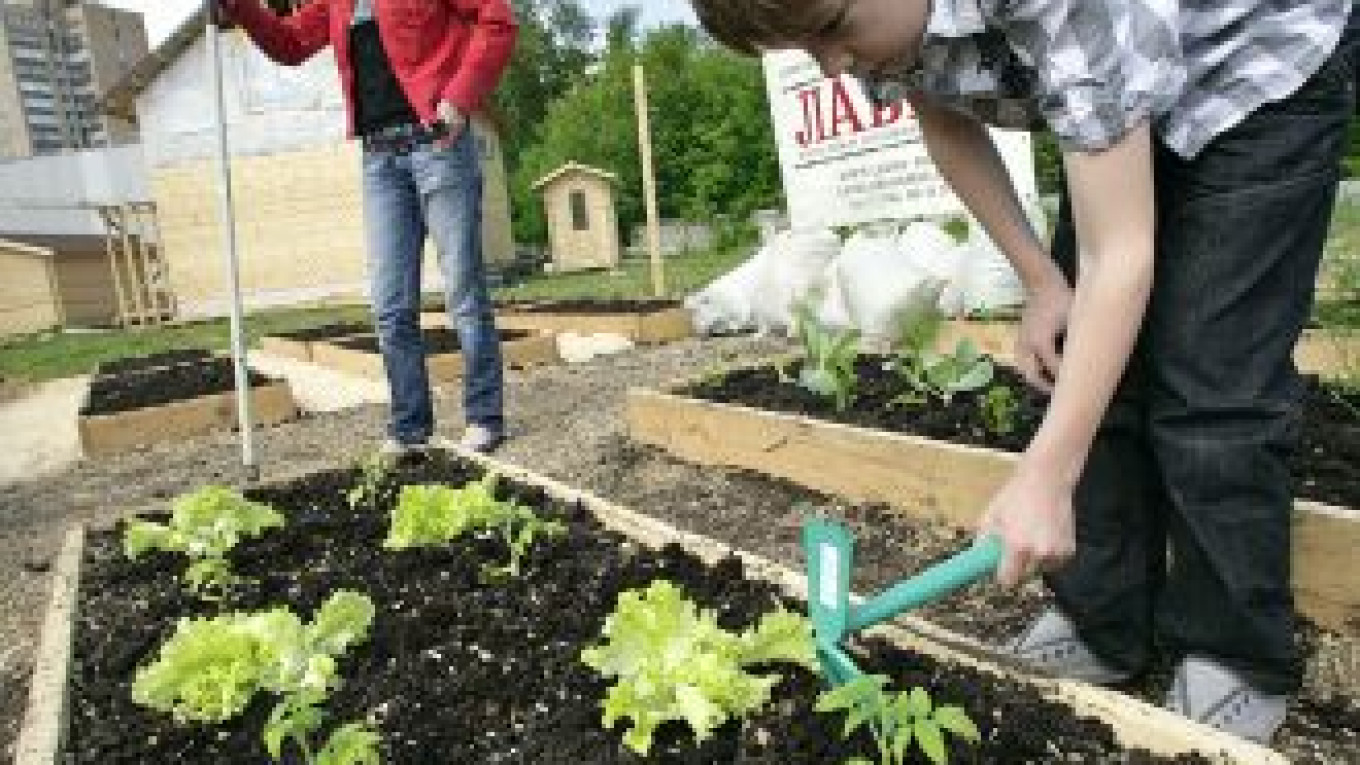U.S. first lady Michelle Obama planted a garden next to the White House to raise awareness about healthy eating.
Now a group of Muscovites hope to get across the same message — and reclaim a former industrial zone — by offering busy urbanites a chance to tend their own greens near Kursky Station, about three kilometers from the Kremlin.
The enthusiasts on Wednesday opened the Ogorod garden, 24 small plots sitting side by side in an area on the periphery of the old Arma gas factory on Nizhny Susalny Pereulok. Although there has not been any heavy industry in the factory area since 2002, the space around the redbrick 19th-century buildings remains underused and somewhat gloomy.
"The idea of reclaiming factory space and turning it into a garden really appealed to us," said Boris Akimov, a food aficionado who runs Lavka Yeda, a company that takes and delivers people's orders for meat, dairy and other country food produced by small farmers.
Lavka Yeda, which has an office on the Arma territory, rented the land for the Ogorod garden and has already rented out 14 plots.
Each plot is a bed measuring 2 meters by 0.7 meters, and costs 1,000 rubles ($33) per month to rent. For 2,000 rubles, Ogorod employees will water the plot daily, and for 5,000 rubles the tenant does not need to do any work and can monitor the plot online "from any corner of the world," Akimov said.
Nobody has requested the deluxe treatment yet.
"Tenants who consistently neglect their plots will be kicked out," said Lilia Dzhebisashvili, who is the garden's coordinator.
Since the small plots are close together, people will not be allowed to grow plants like pumpkins or squash, which require space. Cannabis is also not allowed — "only things that are legal," Dzhebisashvili said.
"We plan to add another 300 square meters eventually, and if the city gardening idea catches on, we'll expand to another area," she said.
The garden will not make any money from the plots but hopes to turn a small profit by offering various gardening workshops and other events.
"Some people often don't even know where food comes from and what it looks like before it hits the stores," said Mikhail Vorobyov, who will act as a consultant for gardeners who lack green thumbs. Vorobyov also hosts two radio shows about dachas and gardens.
Akimov said he hopes to pick up on a trend of organic food that "began in the West already 10 years ago" and make people approach their food choices with more responsibility.
Michelle Obama's decision to turn the White House South Lawn into a 102-square-meter organic garden last spring was a move to encourage healthful eating and sustainability and earned praise from nutritionists and worried parents.
The Arma factory is a vast territory that was built as a gas streetlight enterprise in 1865 and made gas equipment in the Soviet era. Industrial capacities moved out in 2002, and the space is currently rented out to dozens of firms, including Lavka.
"They support us," Akimov said of Arma's owners. "They want the space to be developed creatively."
The garden sits against the far wall of Arma, next to an empty plot with some construction debris that is rumored to soon become a tennis court. The garden's founders had to buy topsoil through an intermediary that is licensed through the Moscow city government.
While most plots were empty Wednesday, some had rows of lettuce, tomatoes and other greens planted for Lavka's own use. Plants can be ordered from a partner of the project, Moskovsky Agroholding.
Vorobyov dismissed fears of pollution. "Any apple you buy at a supermarket might be grown far from the city, but it receives 10 to 12 chemical pesticide sprays, many of which are poisonous," he said.
His confidence didn't sway Polina Kozlovskaya, a journalist who decided to get a plot since she does not have a dacha where she can garden.
"I am going to plant medicinal herbs," she said. "But I wouldn't plant tomatoes here in the center of Moscow."
A Message from The Moscow Times:
Dear readers,
We are facing unprecedented challenges. Russia's Prosecutor General's Office has designated The Moscow Times as an "undesirable" organization, criminalizing our work and putting our staff at risk of prosecution. This follows our earlier unjust labeling as a "foreign agent."
These actions are direct attempts to silence independent journalism in Russia. The authorities claim our work "discredits the decisions of the Russian leadership." We see things differently: we strive to provide accurate, unbiased reporting on Russia.
We, the journalists of The Moscow Times, refuse to be silenced. But to continue our work, we need your help.
Your support, no matter how small, makes a world of difference. If you can, please support us monthly starting from just $2. It's quick to set up, and every contribution makes a significant impact.
By supporting The Moscow Times, you're defending open, independent journalism in the face of repression. Thank you for standing with us.
Remind me later.


